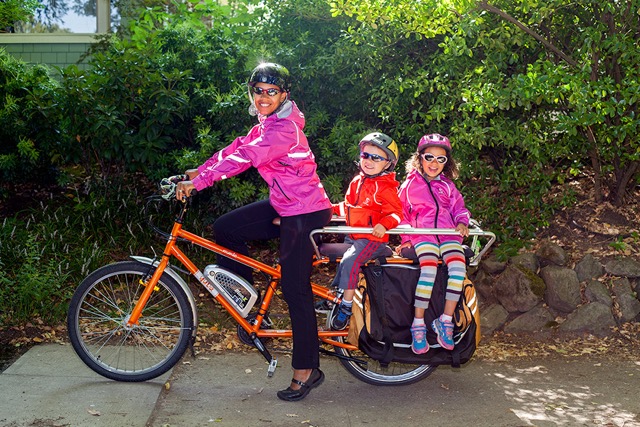In The Driver's Seat with Ingrid Fish
By: Christal Beauclaire
Ingrid Fish oversees transportation decarbonization policy efforts at the City of Portland’s Bureau of Planning and Sustainability (BPS). She has worked for the City of Portland for over 16 years. She has worked for the Financial Planning Department (which is now the City Budget Office) and The Office of Sustainable Development (now the Bureau of Planning and Sustainability). At BPS she worked on a team to develop the City's Climate Action Plan and its Climate Change Preparation Strategy. She also managed the City's Electric Vehicle Strategy development process. Her role now involves looking at the future of the transportation system through a climate and equity lens.

"The goal is to have a majority of Portlanders be able to easily walk or bike to meet all basic, daily, non-work needs."
How does electric transportation play into your work at the Bureau of Planning and Sustainability?
The goal is to have a majority of Portlanders be able to easily walk or bike to meet all basic, daily, non-work needs. This includes our BIPOC and low-income residents, and folks who live in east Portland.
Reducing the need to travel in the first place is our number one. The second is getting people out of vehicles and giving them other realistic options for their commute. The third is transitioning the vehicles that remain on the road to electric vehicles.
I see the city's role as pushing to get the infrastructure in place to be able to support the electric vehicles that are coming and also pushing on the industry side to accelerate the adoption of EVs. A big piece of our planning work is figuring out where things should be in the city and figuring out zoning. Part of that work is connected communities. We're trying to ensure that in all the neighborhoods in Portland, people have access to all of their needs and services ideally within 20 minutes by biking, walking, or taking public transit.
[We are also] trying to incentivize the vehicles that need to be on the road to become electrified including ride-hailing, carshare and smaller delivery service vehicles. Same with freight and heavy-duty. There’s a big crossover with equity because of the disproportionate exposure to transportation-related air pollution that low-income folks face.
It’s also important to electrify transit. We've been advocating for a long time for TriMet, to commit to transitioning their buses away from diesel and into electric, which they say that they're going to do by 2040.
We have to go further to address the issue of installing EV infrastructure in existing buildings, increasing the amount of public charging and develop a process for installing EV chargers in, the right of way.
"Communities should be involved at all levels and centered in any decisions that will directly impact them."
What work at the City is increasing equity in the field right now?
There is a lot of work good happening in the equitable transportation space in the City!
The Pricing Options for Equitable Mobility Task Force is made up of diverse community members and staffed by BPS and PBOT and has come up with recommendations about what an equitable pricing system should and could look like in Portland. Their recommendations will be presented to City Council in October.
The EV Ready Code Project was advised by a group of diverse stakeholders including four community-based organizations representing renters, affordable housing advocates and communities of color. This project is working to develop Portland-specific EV-Ready requirements for new construction buildings, including multifamily residential buildings, to make EV charging accessible to renters. The amount of required EV-Ready infrastructure is expected to exceed the State Building code legislation, HB 2180, which was recently approved by Oregon Legislators.
City staff is in the process of developing the 2040 Freight Plan. There is a huge opportunity to reduce carbon emissions and improve poor transportation-related air quality that disproportionately impacts BIPOC and low-income communities. Covid has hit frontline workers, and people with underlying health conditions such as asthma and respiratory illnesses the hardest. Additionally, Covid has increased the demand for urban deliveries. There’s a huge opportunity to develop a 2040 Freight Plan that massively improves transportation-related air quality issues and decreased transportation-related carbon emissions.
The City partnered with PGE to apply for a DOE grant to expand PGE’s EV charger pilot program which has located level 2 chargers on utility poles in the public right-of-way near Clinton Avenue in SE Portland. If funded, the DOE grant would expand that EV charger program and enable us to locate EV chargers in the ROW (right-of-way) in a more equitable way including in locations all over Portland. These chargers would be accessible to low-income residents as well as carshare and ride-hailing companies that need publicly accessible charging to electrify their fleets.
All of these are different pieces of the puzzle that need to work together to increase access to electric vehicles.
Are electric vehicles something that underserved communities want?
Older generations of lower-income people tend to be less familiar with EVs and emerging mobility technology. Younger generations are more open to exploring electric micro-mobility and EVs.
Many people are unaware of the benefits of EVs and do not understand how the connection between EVs and the issues they care about such as housing costs, displacement, health, and safety. I think it is important to make those connections so that people can see how using (not necessarily owning) these vehicles benefit their communities within the framework of what they care about. Ultimately, communities should be involved at all levels and centered in any decisions that will directly impact them.
In the Driver’s Seat highlights movers and shakers in the transportation industry. If you would like to be featured or to nominate someone to be profiled, email christalb@forthmobility.org

